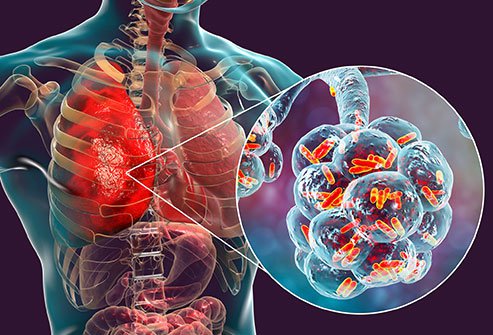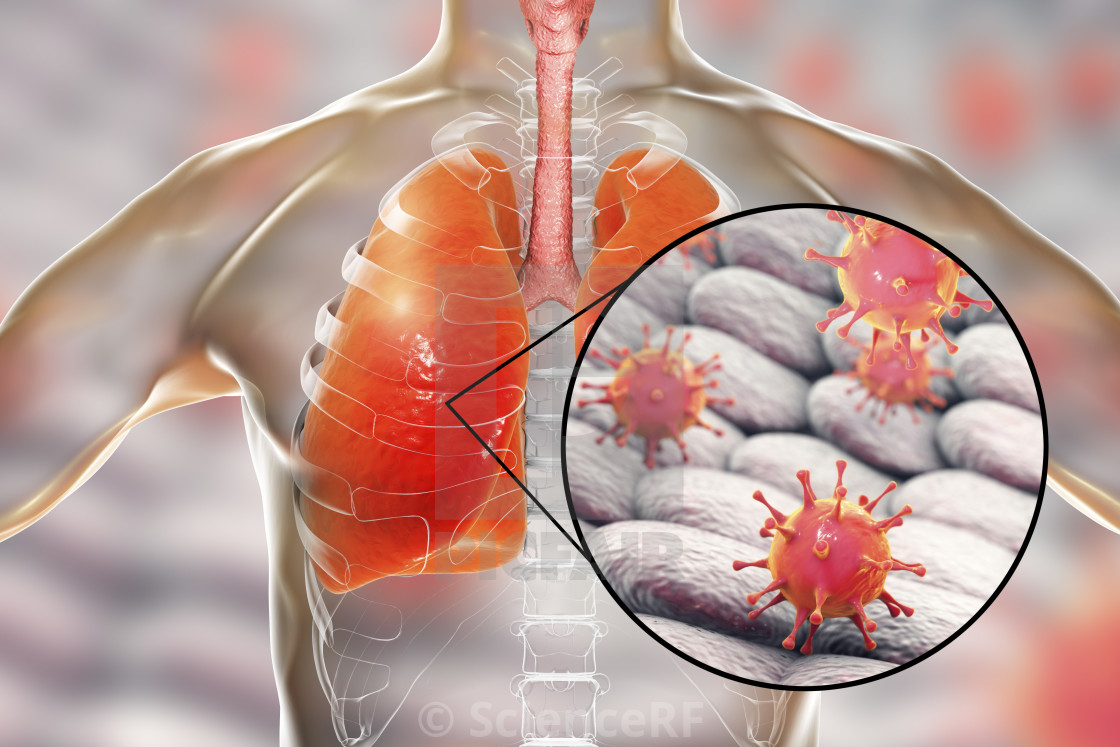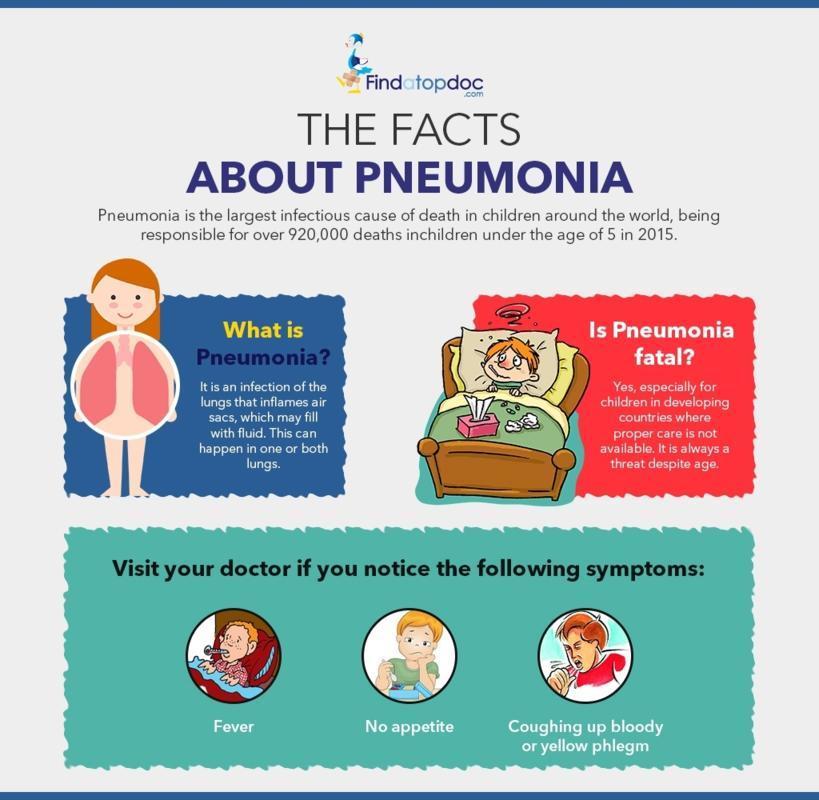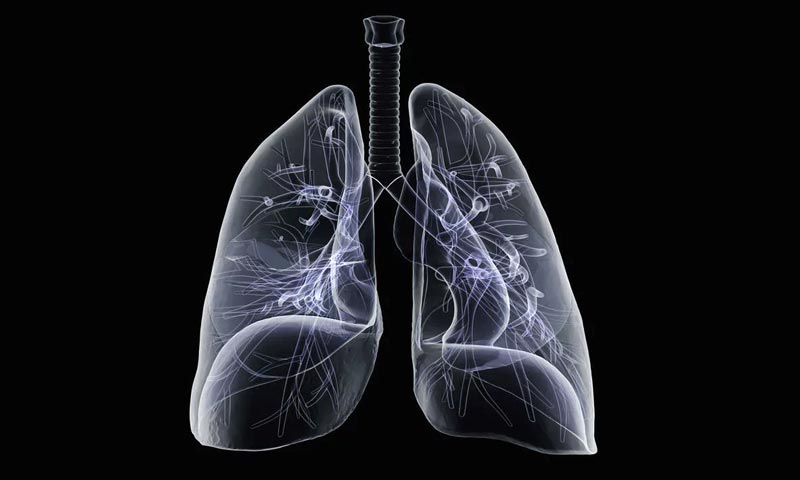Pneumonia is among the most dangerous diseases in the world and the results can be quite fatal if timely intervention is not done. If you think you are displaying signs of pneumonia symptoms but aren’t very sure about it, you should get yourself checked out immediately. It is a dangerous sickness that affects the alveoli – or the lungs’ air sacs – and causes them to get severely inflamed. As a result of this infection, the air sacs will swell up and get filled with pus or other fluids. This will then lead to pneumonia symptoms such as severe cough, chills, high body temperature, and difficulty in breathing. If not treated timely and appropriately, then the consequences can be devastating.
However, before we tell you about pneumonia treatments or the pneumonia vaccine, you should know a bit in detail about its symptoms. Did you know there were some pneumonia home remedies as well? There are and we’ve covered them as well! Keep reading to know as much about this potentially life-threatening disease as you can.
Table of Contents
How To Identify The Symptoms of Pneumonia?
Pneumonia symptoms can vary from person to person and can, thereby, be difficult to identify at times. For instance, they may be very mild in some people while in some others, they may be so severe that they need to be immediately hospitalized. The major reason for this is the difference in the kind of germ that causes the infection. Your overall health, as well as age, are other factors that make pneumonia symptoms differ from one individual to another. However, there are a few common symptoms of this deadly disease that can affect all sufferers. Take a look at the list of them below and then decide what kind of pneumonia treatments to go for after that.
- High body temperature, chills that cause the body to shake, and profuse sweating.
- Shallow and incredibly rapid breathing.
- A persistent cough that may be accompanied by a yellow or greenish mucus. Sometimes, the mucus may also be bloody.
- Unexplained fatigue, loss of appetite, and low energy levels.
- Disorientation in older sufferers.
- Sharp pain in the chest that gets progressively worse as you cough or breathe.
- Vomiting and nausea, especially in kids and other young patients.
If you’re suffering from any of these pneumonia symptoms, you should get to the hospital as soon as you can. Even if the infection turns out to be a mild one, it may make a huge difference in the outcome. So, it’s always better to get the right pneumonia treatments instead of taking a chance that it could be just a common cold and ignoring the signs.
Bacterial pneumonia is among the most common types of pneumonia that affect people. The symptoms of this form of pneumonia will be more severe and require medical attention. A telltale sign along with the other pneumonia symptoms mentioned above will be the nails and lips of the patient turning blue. Additionally, the mental state of the sufferer may turn somewhat delirious.

Viral pneumonia, on the other hand, is one where the symptoms may develop over time. The earliest signs that you have this kind of pneumonia will be similar to those of influenzas, such as high fever, severe cough, and others. Typically, these will escalate within the next couple of days and you will need to get treated as quickly as possible.

What Is The Procedure To Diagnose Pneumonia?
There are cases when it can be extremely difficult to diagnose pneumonia as the symptoms will be similar to other ailments. Also, sometimes, the infection may be confused with another disease. Usually, your doctor will begin by looking at the pneumonia symptoms and asking about the patient’s detailed history. They will then run a couple of tests along with a physical exam.
Some of the things that can be asked in your medical history will include the following:
- If you traveled recently.
- If you came into contact with an animal.
- If you’re recovering from another sickness that afflicted you recently.
- What kind of job you do.
- If you’ve had exposure to others who may be suffering from some kind of ailments at work or somewhere else.
The physical exam will entail your doc listening carefully to your lungs and heartbeat with a stethoscope. In case you have pneumonia symptoms, your lungs will make a gurgling sound as they will be filled with mucus or other liquids.
Then, there will be a couple of diagnostics tests that will be run on you. These will include the following and perhaps certain others depending on the severity of your symptoms.
- Sputum test
- Blood tests
- Bronchoscopy
- Pulse oximetry
- Chest X-rays
- CT scan
- Pleural fluid culture
- Arterial blood gas test

The Best Pneumonia Treatments And Recovery Process:
After you’ve been diagnosed with pneumonia, your doctor will prescribe the treatment for you depending on the type and severity of the disease. Your age, health history, how sick you are, and other factors will be taken into consideration before a treatment plan can be put into action. Do keep in mind that pneumonia treatments will differ from one patient to another. Here’s what you can expect when getting treated for pneumonia:
Antiviral meds will be prescribed in case your pneumonia was caused by a virus. This will help the pneumonia symptoms to subside and make the recovery as easy as possible.
Bacterial pneumonia meds will be given to you in case you have this kind of disease. Remember that it is absolutely essential to complete the course of antibiotics given to you in case of bacterial pneumonia. This is because the disease may return if you decide to discontinue the meds after feeling better.
Home treatment of pneumonia symptoms is also a possibility for those who aren’t affected too severely by this dreaded disease. This entails doing some of the following things:
1. A lot of fluid intakes will help keep the lungs clear by loosening the mucus secretions and pushing the phlegm upward.
2. Never take cough medicines unless your doctor has okayed it as it may sometimes have the reverse effect and increase your lung infection instead of reducing it. This is because you need to cough the phlegm out instead of stopping the coughing.
3. Fever can be controlled by taking the proper medications such as aspirin or acetaminophen among others. Keep in mind that aspirin must never be given to children suffering from pneumonia symptoms.
4. Avoid smoke as much as possible as it will end up irritating your throat and lungs. Keep a safe distance in case there is smoke nearby to avoid inhaling any of it as it isn’t good for the lungs which are already weak because of the infection.
5. Drinking warm beverages, using a humidifier, and hot baths will help relax the body. They will play a major role in opening up the airways which will help you breathe a lot easier.
6. Bed rest will be among the most effective pneumonia home remedies for anyone suffering from this painful ailment. Adults need to take time off work and kids off school to get as much rest as possible. Stay indoors as much as you can and avoid interacting with too many people.
Recovering from pneumonia symptoms will vary depending on the type of pneumonia and the level of infection a person is suffering from. Most mild suffers recover within a week and are able to get back to their normal lives after that. However, it can take a bit of extra time for more serious sufferers of pneumonia. They will need pneumonia treatments that are far more serious instead of pneumonia home remedies. It can take about a month or more for such people to recover completely.
The key is to not rush the recovery process. Trust your doctor’s advice and follow it right down to the letter. Also, another thing you must keep in mind when recovering from pneumonia is to limit your interaction with other people. This is to keep the infection from spreading to them. Besides, the interaction can be exhaustive for sufferers as they are already tired because of the disease.
Remember to wear a mask that covers your nose and mouth as this will prevent germs from spreading when you cough or sneeze. Wash your hands and keep them sanitized. You must also ensure to dispose of used tissues the proper way. If you keep them lying around, others around you would be at risk of catching the infection.
Does Pneumonia Vaccine Help?
Also known as Pneumococcal Vaccine, the pneumonia vaccine is meant to prevent people from being attacked by this specific disease. More specifically, the vaccine targets the type of pneumonia caused by pneumococcus bacteria. However, the pneumonia vaccine does not offer complete immunity. This is because there are over 80 such bacteria that cause bacterial pneumonia. The vaccine covers only about 23 of them. Many doctors still recommend that it is a good one to try.
The pneumonia vaccine that is injected into the body is meant to stimulate the immune system so that it produces antibodies. These will then be directed against the dreaded pneumococcus bacteria. This procedure is termed as immunization.
The reason many people are reluctant to get this kind of pneumonia vaccine is that it does not protect against all types of pneumonia. It does not cover the types that are caused by viruses and other microbes. Many of the pneumococcus bacteria aren’t covered either. However, it is a relief to note that the vast majority of pneumonia symptoms are caused by the 23 pneumococcus bacteria covered by the vaccine.
A special kind of vaccine for pneumonia has been designed for kids below two years old. The conjugated serum is meant to boost especially weak immune systems in sufferers. The new version of this pneumonia vaccine covers around 13 serotypes instead of the 7 covered by the original one. Many doctors recommend that you get your toddlers vaccinated with this.
So, who should get the pneumonia vaccine?
While it may not cover all types of pneumonia, the pneumococcal vaccine can still be effective protection against some of the most dangerous types of this infection. So, if you fall into any of the categories of people listed below, you should consider getting this vaccine.
- Two-year olds with improper spleen function, multiple myeloma, organ transplant, blood malignancy, HIV infection, kidney failure, immunosuppressive conditions, and other such serious ailments should get the pneumonia vaccine for better protection against this deadly disease.
- Those who are 65 and over should get the vaccine as it will offer immunity from the most dangerous types of this sickness. This will help because, at that age, our bodies are not that strong and will act as extra protection.
- Native Americans and certain Alaskan natives should also get immunized with this vaccine as they can be prone to the disease owing to the climate and other living conditions.
- People suffering from heart ailments, lung disorders, diabetes, bronchitis, emphysema, and other such serious medical conditions should consider getting the pneumonia vaccine.
- For patients who need to get their spleen surgically removed, the vaccine is administered around two weeks before the procedure.
Are Pneumonia Home Remedies Effective?
As mentioned earlier, pneumonia home remedies can help alleviate the issue to a vast extent. However, do keep in mind that these are not a replacement for the actual medical pneumonia treatments suggested by your doctor. It is recommended that only mild sufferers of pneumonia symptoms try these home remedies to manage the disease that too, after having received the appropriate medical attention required. Here are a couple of things you can do additionally to manage this problematic sickness at home:
1. For cough: One of the earliest signs of pneumonia is a cough that refuses to go away. Do remember that coughing is not to be completely done away with as your body needs to throw out the phlegm that’s collected in your lungs. However, the cough still needs to be brought a bit under control else it could cause severe chest pain, throat irritation, and other discomfort. You can try salt water gargle to manage your cough. Salt is a natural cleanser and will help clean your throat, get some of the mucus out, and also bring some relief to your sore throat muscles. Drinking hot peppermint tea is another of the best pneumonia home remedies you can try to soothe your throat.
2. For fever: Among the most irritating pneumonia symptoms is a fever that will make you incredibly uncomfortable, to say the least. You can try an over-the-counter pain relief pill to deal with the fever and help reduce the pain. Do make sure to eat something before you take the pain reliever as it can cause acidity on an empty stomach. You may also experience nausea and vomiting if you take the med without any food intake. Remember to adjust the dosage depending on the age of the patient. You can also try a lukewarm compress to help ease the fever.
3. For chills: Fever is typically accompanied by uncontrollable chills that can keep you shaking quite badly. This can last for up to a week depending on when your pneumonia treatment was started and how severe the problem is. To counter this, have a bowl of hot soup a drink warm water as much as possible. Not only will this enable you to stay hydrated, but you will also be warm all over on the inside.
4. For shortness of breath: Severe sufferers must ensure to seek immediate medical aid in case there is shortness of breath. Those who aren’t suffering as badly can try to manage it at home by cooling off in front of a fan. This will help you stay calm and breathe a bit better. Drinking a cup of coffee can also be an incredible air to help you breathe well. This is as caffeine is similar to theophylline, a drug that helps clear the airways of badly infected lungs. The effects of caffeine intake can last up to 4 hours. You should know about the health benefits of chia seeds which can reduce many health issues.
5. For chest pain: Chest pains because of the cough and infection are among the most uncomfortable pneumonia symptoms ever. Pneumonia home remedies to deal with this include turmeric tea and ginger tea among other things. If the pain is too severe to handle, see your doctor immediately.





